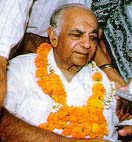Commentary / Mani Shankar Aiyar
Is this the way justice should work?
Justice Misra further found that 'the constituents of the
mobs were the anti-social ruffians and usually not the people of
Indira Gandhi's camp or party.' This conclusion too is open
to challenge. Judge Dhingra has, in effect, challenged it. But
it is not clear what, apart from instinct, has led to this challenge.
We, the general public, are left to choose between the contradictory
findings of a Supreme Court chief justice and an additional sessions
judge, the one based on evidence, the other on assertion. Is this
the way justice should work?
Justice Misra was painstaking in his collection of evidence against
the Congress (I). He says, 'Nineteen instance have been catalogued
where people associated with Congress (I) have been named as organisers...
Conceding that there is no particular reason to disbelieve the
allegations so tabulated, considering the position occupied by
these people, the commission is not in a position to hold that
from their participation, the Congress (I) party as such can be
found to have organised the violence.'
Judge Dhingra, on the contrary, claims that the massacre was 'a
well-thought-of decision on the part of those who were ruling
the country at that time.' This would be serious enough as
a charge in a newspaper editorial. Coming from a judge, it is
even more serious. And coming as it does in flagrant contradiction
of a Supreme Court chief justice's findings, it cannot be any
more serious.
Justice Misra then goes into the etymological origins of the
expression 'to organise' and comes to the conclusion, 'To
organise' thus involves a process which requires time, men, money
and an aim or goal... the commission has come to the conclusion
that the violence was not organised by the Congress (I) party
or any official who matters in the party.' However, Justice
Misra also adds that 'many of the participants were people
from the lower ranks of the Congress (I) party and sympathisers.'
The identification of these 'lower ranks and sympathisers'
has been going on for over a decade. Several of the 93 hauled
before Judge Dhingra could, I am sure, be so classified. It would
have constructively contributed to the ends of justice if Judge
Dhingra had, even as a pilot exercise, determined who among the
93 arraigned before him could be so classified and through them
validated his conjecture of a 'conspiracy.' This he
did not do. A major opportunity of unearthing the 'conspiracy'
has been missed. Unless, of course, Justice Ranganath Misra was
right -- and there was no conspiracy.
Justice Misra examined in some detail the charges against
H K L Bhagat, then and in the elections that followed the riots,
MP for East Delhi, scene of the Trilokpuri massacre and several
other brutalities. Justice Misra did not find him culpable. Bhagat
was, however, arrested earlier this year and is standing trial
before Judge Dhingra.
In remanding Bhagat to custody, Judge Dhingra passed a number
of remarks about politicians as a class. These remarks went largely
unnoticed at the time -- possibly because Parliament was not in
session. When, however, Judge Dhingra made similar sweeping generalisations
in remanding Kalpanth Rai to custody, Parliament was in session.
The Speaker took up the matter with the chief justice of the Delhi
high court. Judge Dhingra's remarks were expunged from the record.
The Speaker stated in the House that he expected the Delhi high
court's observations to apply similarly to other cases, such as
Bhagat's.
 Transferring the Lakhubhai Pathak case out of Chief Metropolitan Magistrate
Prem Kumar's court to another court, the Supreme Court has observed
that this has been done so that 'justice is done and seen
to be done.' When judgments are written like editorials
and encompass matters beyond the purview of the accusations at
hand, there is the danger of justice done being obscured by justice
not being seen to be done.
Transferring the Lakhubhai Pathak case out of Chief Metropolitan Magistrate
Prem Kumar's court to another court, the Supreme Court has observed
that this has been done so that 'justice is done and seen
to be done.' When judgments are written like editorials
and encompass matters beyond the purview of the accusations at
hand, there is the danger of justice done being obscured by justice
not being seen to be done.
|





 Transferring the Lakhubhai Pathak case out of Chief Metropolitan Magistrate
Prem Kumar's court to another court, the Supreme Court has observed
that this has been done so that 'justice is done and seen
to be done.' When judgments are written like editorials
and encompass matters beyond the purview of the accusations at
hand, there is the danger of justice done being obscured by justice
not being seen to be done.
Transferring the Lakhubhai Pathak case out of Chief Metropolitan Magistrate
Prem Kumar's court to another court, the Supreme Court has observed
that this has been done so that 'justice is done and seen
to be done.' When judgments are written like editorials
and encompass matters beyond the purview of the accusations at
hand, there is the danger of justice done being obscured by justice
not being seen to be done.